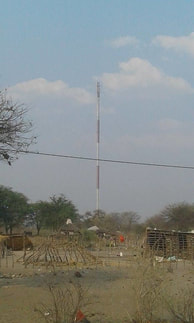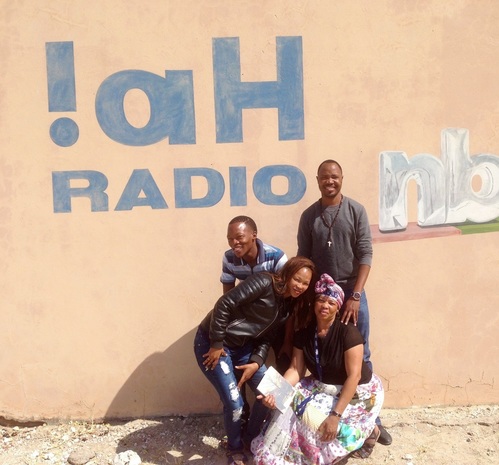
I began to ponder the creation of a self-perpetuating stream of content for !Ah radio. It could address local issues but in an edutainment way. How? Via a radio drama, what used to be called a Radio Soap, back in the day. (Growing up in South Africa I was an avid listener of Lux radio theatre.) It seemed to me, that encounters with elephant or lion aside, the day-to-dayness of living in the rural community which is Tsumkwe and surrounds might be something like life in the fictional farming town of a long-running radio drama on the BBC called ‘The Archers’. No-one in The Archers has to go to bed hungry, as far as I know, nor walk 25km to get to a clinic, but I was thinking about the characters – people of the land, old and young, neighbours and relatives and the things that befall them. Sometimes The Archers does melodrama. Well! Who could forget Helen's trial for the stabbing of her abusive husband. I recalled a real-life tragedy in Tsumkwe, when a man stabbed his beautiful wife to death. Unlike The Archers the weapon to hand was an antelope horn rather than a kitchen knife. An African Archers for the people of the Nyae Nyae, is what I imagined. The staff at !Ah were very keen on the idea of using local talent to create a radio drama and confirmed what I already knew – that the Ju|’hoan are great oral performers. If scripts could be produced, actors would be found, they assured me. But I’d have to get the station owner, the Namibian Broadcasting Corporation (NBC) on board. Back in Windhoek, I secured a meeting with Glynis Beukes-Kapa, executive producer of educational content at NBC. She immediately arranged for me to pitch the drama idea to her boss, Ms Menesia Muinjo, Chief of News and Programming. Ms Muinjo was lunching in the staff canteen, but invited me to join her and her colleague, Mr Mushitu Mukwame, who, as luck would have it, is the Head of NBC Radio Services. As she pushed away her plate she exclaimed: “We have been waiting for you!” It seems the NBC has received a government directive to produce 80% local content on radio. !Ah radio, the Ju|’hoan station, is falling short of this target (due largely to the logistical problems of getting out into the bush to gather news and stories, the !Ah producers told me.) But a radio drama, created by local people for local people, would help. If a 13-episode pilot proved successful, said Ms Muinjo, the show could run and run. Thirteen episodes… I began to sweat. Ms Muinjo liked the idea so much she phoned the Director General’s secretary and asked for a meeting then and there. Granted. So up the executive staircase we climbed, and I soon found myself pitching the idea to the Director-General himself, Mr Stanley Similo. He nodded throughout and confirmed the NBC would like to partner with us (Gulp. I’d only just had the idea. My employer, the University of Wolverhampton, knew nothing about it yet. Any minute now my deodorant would fail.) Mr Similo seemed keen to make a narrative about the training and production of the proposed radio drama for television. To show to a national audience. Also, if successful, the drama could be a model for other radio stations in the country, he said. Gulp-gulp. On the long flight home I wrote copious notes about how this project might actually work. Weirdly, it didn’t scare me. Having worked with the San I know how talented they are. I can almost hear the soundscape of the fictional world they could create, the uniquely Ju|’hoan jingle someone will compose, the appealing characters they will suggest to people the drama. We might have to produce radio scripts in an unconventional way at first, but I’m confident the Ju|’hoansi involved will come up with great story lines and deliver convincing performances. And, I suspect, they’ll improve their reading-writing literacy in their mother-tongue along the way. So all I have to do now is find a sponsor for the training workshops. Anyone know an executive in a soap powder company? Or a media mogul with an active social conscience? * http://www.macalester.edu/educationreform/publicintellectualessay/Gratz. Accessed 1-10-2016 Few parents engage in Adult Literacy programmes on offer; one reason mooted by researchers is lack of access to the labour market, even for reading-writing literates. (Survey by Lee quoted in Hays, 2016:228) Hays, J. Owners of Learning: The Nyae Nyae Village Schools over Twenty Five Years . Switzerland: 2016. Basler Afrika Bibliographien Photo of NBC mast courtesy of #Oma Leon Tsamkxao
0 Comments
|
AuthorAfrican novelist and out-to-grass, academic. Archives
January 2024
Categories
All
|

 RSS Feed
RSS Feed